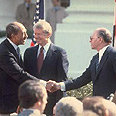
Five PMs, one mistake
Op-ed: Over the years, Israel's leaders conveyed to the world that we are capable of resolving Palestinian issue on our own
Even the most ardent supporters of the resumption of peace talks with the Palestinians are finding it difficult to remain optimistic regarding the results of the negotiations. The main reason is that the agreement, in the event that one will be reached, will have the characteristics of a zero-sum game (the more I have, the less you have – and vice versa). In this situation the concession will always appear to be greater than the gain, and this is why both sides are apprehensive.
Did we have to end up in this situation? Not necessarily. It happened because five Israeli prime ministers inadvertently sent the world a consistent message according to which the Palestinian problem is ours alone and only we know how to resolve it.
The first was Menachem Begin. After reaching the understandings on an Israeli-Egyptian peace agreement, he was asked by Sadat: What about the Palestinians? Begin replied: We will grant them autonomy in Judea and Samaria. They will be pleased, and so will we. Sadat understood that those who will benefit most from this will be the Egyptians – and agreed.
Shortly thereafter we once again took our fate in our hands and went out on our own to solve the Palestinian problem in Lebanon (First Lebanon War, 1982). A few years later, in 1988, King Hussein of Jordan and Israeli Foreign Minister Shimon Peres reached understandings on the establishment of a federation between Jordan and part of the West Bank. Formally the West Bank was still territory conquered from Jordan, its residents were Jordanian subjects and the official currency was the Jordanian dinar.
Prime minister Yitzhak Shamir vehemently objected to the understandings. Hussein got the message and gradually led to a situation in which Jordan relieved itself of any responsibility. "You talk to the PLO," he said.
Reassess the situation
Five years later prime minister Yitzhak Rabin became convinced of our ability to reach an agreement with the PLO – just us and them. We'll update the Americans at the conclusion of the process. This is how the Oslo agreement was born.
Another seven years past, and in 2000 Prime Minister Ehud Barak reached the conclusion that a generous offer to Arafat would result in a permanent agreement. That is how the Second Intifada began.
Three years later, Prime Minister Ariel Sharon did some soul-searching and said: Our efforts to achieve peace with the Palestinians did not pan out, so let's take our fate into our own hands and seek a "divorce" from the Palestinians. This is how the Disengagement plan was born.
Despite all the differences in their worldviews and decisions, all these prime ministers had one thing in common: They sent the world a message that Israel knows how to resolve the Palestinian issue on its own. Indeed, the world expects us to.
And this is precisely the problem: Israel and the Palestinians are incapable of resolving the conflict on their own. More specifically, the conflict cannot be resolved in the area between the Jordan River and the sea. The cards we had before the peace treaty with Egypt, before 1988 and prior to the peace agreement with Jordan – we wasted on nothing. Now it will be very difficult to come up with a new narrative.
Even if we assume that the current negotiations won't lead to a solution either, after 20 years it would be right to finally convince the US to truly "reassess" the situation and reexamine the two assumptions it has been clinging to: The first is that a solution must be limited to the area between the Jordan River and the sea, and the second is that the only solution to the conflict is "two states" within this defined area.
When we free ourselves of these assumptions we find out that there are a number of options that can benefit all four key players: Egypt, Jordan, Israel and the Palestinians. Land swaps between the countries, for example. Egypt and Jordan stand to gain the most from this, by the way.










